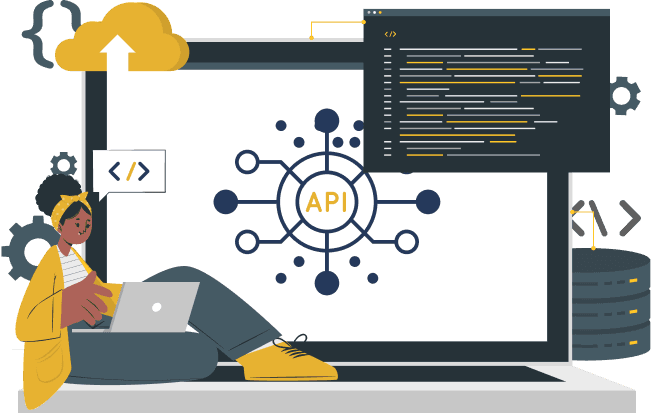Next.js provides a comprehensive set of features out of the box, including automatic code splitting, hot module replacement (HMR), and CSS-in-JS support through styled-jsx. It also integrates seamlessly with popular libraries and tools like TypeScript, Sass, and GraphQL, enhancing developer productivity and flexibility.
Next.js offers static site generation, allowing developers to pre-render entire pages at build time. This is particularly useful for content-heavy websites or blogs where the content doesn’t change frequently. By generating static HTML files, Next.js improves loading speed and reduces server load, making the website more efficient and scalable.
Next.js simplifies client-side routing with its built-in routing system, eliminating the need for additional routing libraries. This enables developers to create intuitive and dynamic navigation experiences while maintaining clean and organized code.
Next.js supports server-side rendering, which improves SEO performance and initial page load times by rendering pages on the server before sending them to the client. This ensures better indexing by search engines and faster time-to-content for users.
Next.js offers static site generation, allowing developers to pre-render pages at build time and serve them as static HTML files. This approach enhances performance, scalability, and security by reducing server load and eliminating the need for server-side processing.
Next.js automatically splits JavaScript bundles based on page routes, ensuring that only the necessary code is loaded for each page. This improves performance by reducing initial bundle size and speeding up page load times, especially for larger applications.
Next.js uses a file-based routing system, where routes are defined by the file structure of the project. This simplifies route management and makes it easier to organize and maintain application code, especially in larger projects with complex routing requirements.
Next.js provides built-in support for CSS modules, allowing developers to encapsulate styles within component scope and prevent style conflicts. Additionally, Next.js supports Sass preprocessing, enabling developers to use variables, mixins, and other Sass features in their stylesheets.
Next.js includes built-in API routes, allowing developers to define server-side endpoints directly within their Next.js applications. This simplifies backend integration and enables seamless communication between the client and server, making it easier to build full-stack applications.
Next.js offers native support for TypeScript, a statically typed superset of JavaScript. TypeScript enhances code quality and developer productivity by providing type checking, auto-completion, and other advanced features, making it easier to catch errors and write maintainable code.
Next.js includes built-in image optimization capabilities, automatically optimizing images based on device size and screen resolution. This improves performance and reduces bandwidth usage by serving appropriately sized images to users, resulting in faster page loads and better user experience.
Next.js has a large and active community of developers who contribute to its ecosystem by creating plugins, extensions, and tutorials. This rich ecosystem provides developers with access to a wide range of resources and support, making it easier to build and maintain Next.js applications.
Establish and follow UI patterns and design guidelines throughout your application. Consistency in layout, styling, and interaction patterns helps users navigate the interface more easily.
Design and develop UIs with accessibility in mind. Use semantic HTML, provide alternative text for images, ensure keyboard navigation, and test with assistive technologies to ensure all users can access and interact with your application.

HN9 specializes in dynamic website development, with a team of experienced developers proficient in modern web technologies and frameworks. This expertise ensures that your website is built using the latest tools and techniques, resulting in a dynamic and engaging user experience.
HN9 understands that every project is unique, and they work closely with clients to understand their specific requirements and goals. They offer custom solutions tailored to your needs, whether you’re building a small business website, an e-commerce platform, or a complex web application.
HN9 prioritizes efficiency and performance in their development process. They optimize code, leverage caching techniques, and implement best practices to ensure fast loading times and smooth performance, even for dynamic websites with complex functionalities.
HN9 designs and develops websites with a mobile-first approach, ensuring that your website looks and functions seamlessly across devices and screen sizes. They use responsive design techniques and test rigorously to guarantee cross-platform compatibility.
HN9 prioritizes security and reliability in their development process. They implement robust security measures to protect against common threats like SQL injection and cross-site scripting (XSS) attacks, ensuring that your website and user data remain safe and secure.
HN9 specializes in dynamic website development, with a team of experienced developers proficient in modern web technologies and frameworks. This expertise ensures that your website is built using the latest tools and techniques, resulting in a dynamic and engaging user experience.
HN9 understands that every project is unique, and they work closely with clients to understand their specific requirements and goals. They offer custom solutions tailored to your needs, whether you’re building a small business website, an e-commerce platform, or a complex web application.
HN9 prioritizes efficiency and performance in their development process. They optimize code, leverage caching techniques, and implement best practices to ensure fast loading times and smooth performance, even for dynamic websites with complex functionalities.
HN9 designs and develops websites with a mobile-first approach, ensuring that your website looks and functions seamlessly across devices and screen sizes. They use responsive design techniques and test rigorously to guarantee cross-platform compatibility.
HN9 prioritizes security and reliability in their development process. They implement robust security measures to protect against common threats like SQL injection and cross-site scripting (XSS) attacks, ensuring that your website and user data remain safe and secure.
In today’s digital landscape, industries across the spectrum are harnessing the power of ReactJS to craft immersive and dynamic web experiences. From e-commerce giants revolutionizing online shopping interfaces to fintech platforms streamlining financial transactions, ReactJS stands as the cornerstone technology driving innovation and efficiency.





Next.js is a React framework developed by Vercel that enables server-side rendering, static site generation, and client-side rendering, all in one package. It simplifies React application development by providing built-in features like routing, server-side rendering (SSR), and static site generation (SSG).
Next.js offers several advantages, including improved performance through server-side rendering and static site generation, simplified routing, built-in support for CSS-in-JS, and seamless integration with popular tools like TypeScript and GraphQL. It's a versatile framework suitable for various types of web applications.
Yes, Next.js is highly suitable for SEO (Search Engine Optimization) due to its support for server-side rendering (SSR) and static site generation (SSG). By pre-rendering pages on the server and serving them as static HTML, Next.js improves search engine visibility and page load times, leading to better SEO performance.
Yes, Next.js has excellent support for TypeScript out of the box. You can create Next.js projects with TypeScript by simply selecting the TypeScript option during project initialization or by adding TypeScript manually to an existing project.
Yes, Next.js is well-suited for building e-commerce websites. Its support for server-side rendering (SSR) and static site generation (SSG) ensures optimal performance and SEO, while its flexibility allows for seamless integration with e-commerce platforms and APIs.
Next.js applications can be deployed to various hosting providers, including Vercel, Netlify, AWS, and Heroku. Vercel offers seamless deployment and hosting specifically optimized for Next.js applications, while other providers may require additional configuration.
Ready to create something great? Out years of experience mean we can handle any idea, big or small.

Copyright @2026 Hn9 Codecraft. All rights reserved

